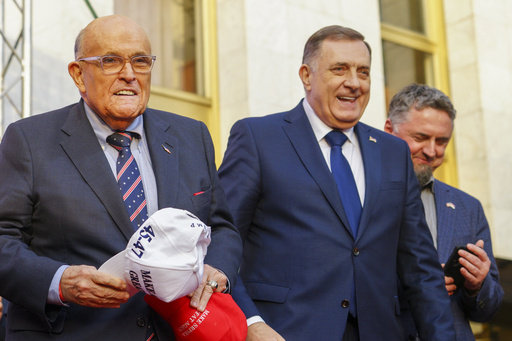In Banja Luka, Bosnia-Herzegovina, supporters of the separatist Bosnian Serb leader, Milorad Dodik, gathered on Tuesday amidst escalating tensions before a crucial court decision expected on Wednesday. This decision could lead to Dodik, who favors aligning with Russia, being banned from politics or even sentenced to prison.
The longstanding case against Dodik involves allegations of his refusal to comply with the directives from the top international envoy ensuring peace in Bosnia. Conviction could result in a prison term lasting up to five years, accompanied by a ten-year prohibition from participating in political affairs.
Dodik has vehemently vowed to defy any adverse ruling and has warned of undertaking “radical measures,” potentially including the secession of Republika Srpska, the Serb-governed region in Bosnia, from the federation.
Following a bloody civil war that pitted Bosniaks, predominantly Muslims, Serbs, and Croats against each other, peace was ushered in through a U.S.-mediated agreement in 1995, which created two autonomous entities: Republika Srpska and the Bosniak-Croat Federation.
The international accord granted these entities wide-ranging autonomy but mandated the maintenance of shared institutions such as the army, judiciary, and tax system, along with a rotating presidency representing Bosniaks, Serbs, and Croats.
Despite facing legal proceedings, Dodik has made it clear that he will not attend the court hearing scheduled for Friday. Given his strong backing from Serbia’s President Aleksandar Vucic, it’s unlikely that he will be imprisoned, and should he be convicted, an appeal is expected.
Dodik’s recurrent calls for the secession of the Serb-administered region have drawn sanctions from the United States and the United Kingdom. He faces accusations related to corruption and adopting pro-Russian stances, furthering unease in Bosnia, a country still healing from the 1992-95 conflict that claimed 100,000 lives and displaced millions.
Republika Srpska’s estrangement has garnered Russian backing for Dodik, who has also publicly expressed admiration for former U.S. President Donald Trump. At the rally, his supporters, brandishing flags bearing his image, were joined by notable attendees, including former New York City Mayor Rudy Giuliani.
Addressing the gathering, Dodik stated that the trial targets Bosnian Serbs, emphasizing, “They could not put you all in prison, so they chose me instead.”
In response, High Representative Christian Schmidt, tasked with supervising Bosnia’s compliance with the Dayton Accords, reassured citizens of continued international vigilance, affirming the commitment to maintaining peace and stability, with Bosnia’s unity being non-negotiable.
Dodik’s ongoing clashes with Schmidt center around defying his authority in Republika Srpska. The Dayton Accords enable the high representative to enforce decisions and amend laws as necessary to uphold peace.
The Bosnian conflict arose with the Serbs’ resistance against Bosnia’s independence from Yugoslavia, as they sought to create a separate state with aspirations of joining Serbia. Yet like many Balkan nations, Bosnia’s journey towards European Union membership remains sluggish.


